Choosing the right stock broker is the first step to successful investing. This guide compares the top FCA-regulated UK brokers, ranked by fees, platform quality, market access, and investor protection.
All platforms reviewed are FSCS protected up to £85,000, making them safe, low-cost options whether you’re a beginner building your first portfolio or an active trader managing global markets.
What are the best UK stock brokers in 2025?
|
4.8
|
4.6
|
4.5
|
|
30 million users globally trust eToro for their stock trading needs. |
A reliable trading platform offering a wide range of markets, advanced tools, and educational resources to empower traders of all skill levels. |
Award-winning trading platform offering extensive market access and advanced tools for both beginner and experienced traders. |
|
|
|
|
61% of retail CFD accounts lose money.
|
73% of retail investor accounts lose money when trading CFDs with this provider.
|
69% of retail investor accounts lose money when trading CFDs with this provider. You should consider whether you can afford to take the high risk of losing your money.
|
30 million users globally trust eToro for their stock trading needs.
- User-friendly
- Copy the moves of professional traders
- Social trading & educational features
- Commission-free stock trading
A reliable trading platform offering a wide range of markets, advanced tools, and educational resources to empower traders of all skill levels.
- User-friendly platforms with intuitive design
- Wide range of instruments, including forex, stocks, and CFDs
- Comprehensive educational tools and webinars
Award-winning trading platform offering extensive market access and advanced tools for both beginner and experienced traders.
- User-friendly platform with advanced trading tools
- Comprehensive educational resources and demo account
- Wide range of markets
List of UK stock brokers
Here’s a concise overview of the top FCA-regulated stock brokers in the UK, selected through detailed hands-on testing and analysis.
- eToro – Overall best stock broker UK for beginners
- XTB – Best stock broker for utilising leverage
- IG – Best stock broker UK for a large selection of investment options
- Plus500 – One of the best online stock brokers for short-term trading of CFDs
- Interactive Brokers – Best UK stock broker for experienced traders
- Trading 212 – Best online broker UK for auto investing
- AJ Bell – Best traditional stock broker
- Saxo – Best online stock broker for professional traders
- Hargreaves Lansdown – One of the oldest stock brokers in the UK
- Webull – One of the cheapest online stock brokers
Best UK stock brokers compared
This comparison ranks the leading UK stock brokers across six essential factors every investor should consider.
| Rank | Broker | No. of stocks | No. of stock markets | Real stock fees | Non-trading fees | Minimum deposit | Trading platforms |
|---|---|---|---|---|---|---|---|
| 1 | eToro | 3,000+ | 17 | £0 | $5 withdrawal fee, inactivity fee, currency conversion fee | $50 | Proprietary web trading platform and mobile app |
| 2 | XTB | 3,100+ | 17 | £0 | Inactivity fee of £10 per month after 1 year of trading inactivity and if no deposit was made in the last 90 days | £0 | Proprietary web trading platform/mobile app xStation 5 |
| 3 | IG | 12,000 | 8 | Depends on how many trades you made in the preceding months | Quarterly custody fee, inactivity fee charged only after 2 years | £250 | Proprietary web trading platform/mobile app, MetaTrader 4, ProRealTime, L2 Dealer |
| 4 | Plus500 | 1,900 stock CFDs | 6 | S&P 500 CFD spread: 0.7 | Inactivity fee of $10 per quarter after 3 months if you don’t log in | $100 | Proprietary web trading platform/mobile app Web-Trader |
| 5 | Interactive Brokers | 12,162 | 90 | Fixed pricing: $0.005 per share, min. $1, max. 1% of trade value | One withdrawal free per month, after that $10 | £0 | Trader Workstation (TWS), IBKR GlobalTrader, IBKR Mobile, IMPACT |
| 6 | Trading 212 | 7,000+ | 14 | £0 | 0.7% fee if you deposit over €2,000 in total into your Invest account using credit/debit cards or electronic wallets | £0 | Proprietary web and mobile platform |
| 7 | AJ Bell | 13,000+ | 19 | £9.95 commission per trade. £4.95 per if you have more than 10 trades in the previous month | Custody fee of 0.25% per annum | £0 | Proprietary Youinvest web and mobile platform |
| 8 | Saxo | 23,500+ | 50 | $0.02/share | €120 inactivity fee, 0.15% custody fee | £0 | Proprietary web trading platform/ mobile app SaxoTraderPRO, SaxoTraderGO, MetaTrader 4 |
| 9 | Hargreaves Lansdown | 8,000+ | 21 | Based on previous month: 0-9 trades: £11.95 per trade; 10-19 trades: £8.95 per trade; 20+ trades: £5.95 per trade | £0 | £0 | Proprietary web and mobile platform |
| 10 | Webull | 1,000+ | 5 | £0 | £0 | £0 | Proprietary web and mobile platform |
Stock broker reviews
Around 42% of UK adults now invest or trade, up from 36% in 20211.
With more people entering the market, picking a trusted, FCA-regulated broker has never been more important.
After four years working in London’s retail investment sector, I’ve tested many of the UK’s top platforms first-hand.
Based on that experience, this guide ranks the best stock brokers in the UK using six key criteria:
- Stock range and market access
- Trading and non-trading fees
- Minimum deposit
- Platform tools and usability
All brokers featured are FCA regulated and offer FSCS protection up to £85,000.
You can read about how we test platforms here.
This article was reviewed by Tobi Opeyemi Amure, a trading expert and writer at Investopedia, Investing.com, and Trading.biz.
1. eToro – Overall best stock broker UK for beginners

The overall winner on our list of the best online stock brokers, and what we recommend to beginners, is eToro.
eToro ranks as a top online stock broker in the UK, with a user base of over 30 million since 20072. The platform is known for its safety, registered by the UK’s FCA and CySEC. It offers up to £85,000 protection through the FSCS.
eToro’s appeal includes its no-commission policy on many stocks in the UK and globally. It also supports fractional shares, allowing investment in big stocks like Apple and Google for as little as £8.
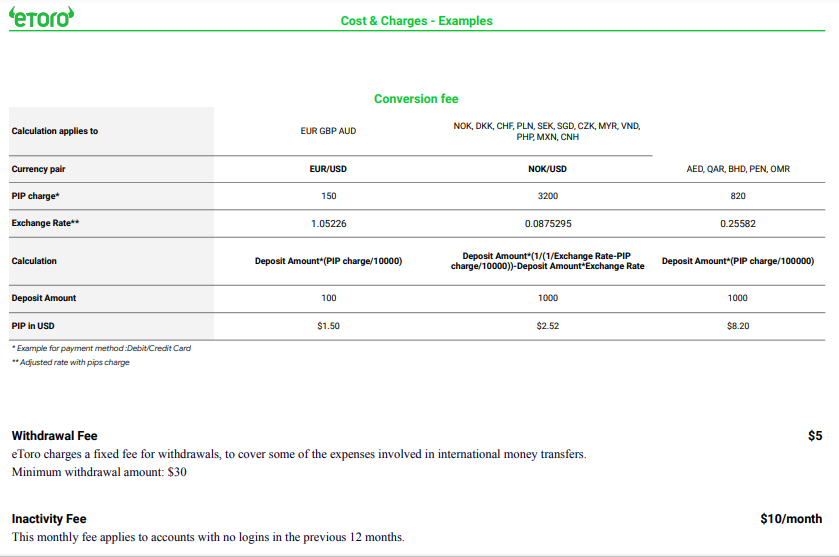
Key Features, Tools & Platforms
☑️ Intuitive Design: eToro’s platform features a user-friendly interface that’s easy to navigate on both desktop and mobile. This makes it ideal for beginners who want a smooth, stress-free investing experience.
☑️ Demo Account: eToro offers a virtual trading account loaded with $100,000 in play money. It’s an excellent tool for users to practice strategies, explore the platform, or just get comfortable before using real funds.
☑️ CopyTrader: This is eToro’s standout feature. The feature allows you to automatically replicate the trades of top-performing investors. It’s a unique way to learn from experienced traders while potentially profiting from their strategies. CopyTrader is another feature that makes eToro perfect for those new to the markets.
☑️ Wide Asset Range: eToro is not just for stock trading. It offers over 90 crypto options and CFD trading in forex, goods, and indices, all from a single account. This makes it a diverse trading place.
☑️ Smart Portfolios: These are pre-constructed investment portfolios designed for long-term growth. Smart Portfolios group assets around specific themes (like tech, renewable energy, or crypto). And with over 40 to choose from and no management fees, they offer hands-off investing with built-in diversification.
☑️ Fractional Shares: This allows you to invest as little as £8 in high-value stocks (like Apple and Google).
☑️ eToro Academy: This is a free learning hub filled with beginner-friendly guides, video tutorials, and market insights. It is a valuable resource for beginners looking to have a solid foundation in investing and trading.
| ⭐ Highlight Feature: One of the best things about eToro is that it offers interest on uninvested cash balances, with rates ranging from 1% to 5.3% annually. This feature is great because it adds value for traders holding funds on the platform. |
What We Like About eToro
eToro stands out as the best stock broker for beginners in the UK thanks to its simple interface, real-time charts, and built-in market insights.
The CopyTrader feature lets new investors mirror expert portfolios, making learning practical and interactive.
You can trade real stocks with 0% commission, start with a minimum deposit of $50, and fund your account using several secure payment options.
Potential Drawbacks
While eToro offers a range of benefits, it also has a few downsides worth considering. For example, it does not offer tax-efficient investment wrappers, such as Individual Savings Accounts (ISAs) and Self-Invested Personal Pensions (SIPPs), which are popular among UK investors.
The absence of these tax wrappers means any profit or dividends earned on the platform may be subject to UK capital gains tax or dividends tax.
However, there is now a partial workaround, with users now able to access a Stocks and Shares ISA powered by Moneyfarm through a partnership with eToro.
Also, while eToro commission-free stock trading makes it desirable, users should be mindful of some of its fees. For example, a $5 withdrawal fee applies when taking funds out of your account. There’s an inactivity fee after 12 months without login, and non-stock trades (e.g. crypto, CFDs) may carry spreads or other fees.
| 👉 Our Take: eToro suits both beginners and experienced UK investors, offering a full range of trading tools and social features. It’s ideal for those seeking low-cost stock trading, an easy-to-use platform, and access to a community where you can learn from and copy professional traders. |
Read our eToro review.
Key rating criteria:
| No. of stocks | No. of stock markets | Real stock fees | Non-trading fees | Minimum deposit | Trading platforms |
|---|---|---|---|---|---|
| 3,000+ | 17 | £0 | $5 withdrawal fee, Inactivity fee, currency conversion fee | $50 | Proprietary web trading platform and mobile app |
Pros:
- Commission-free trading for stocks and ETFs
- Smooth and straightforward account setup process
- Access to social trading features
Cons:
- $5 charge for withdrawals
- Limited to a single account currency option
- Room for improvement in customer support services
Zero commission means that no broker fee will be charged when opening or closing the position, and does not apply to short or leveraged positions. Other fees apply, including FX fees on non-USD deposits and withdrawals. Your capital is at risk. For more information, click here.
2. XTB – Best stock broker for leverage

XTB, launched in 2002, is recognised as a leading stock broker in the UK. It allows the trading of real stocks and CFDs on 17 global exchanges, offering a broad array of investment choices.
Investors enjoy 0% commission on stock trades, with a commission-free trading equivalent of up to €100,000 monthly turnover. Beyond this limit, a 0.2% fee applies (minimum £10).
A 0.5% currency conversion fee may also be charged. This makes it an attractive choice for cost-conscious investors.
Traders have access to over 3,100 stock CFDs from the UK, US, and European markets, ensuring a wide-ranging trading experience. XTB also provides CFDs in commodities, indices, ETFs, and forex, enabling portfolio diversification.
Investors can also leverage positions up to five times their cash investment. This means with only £200, one can hold stocks worth £1,000.
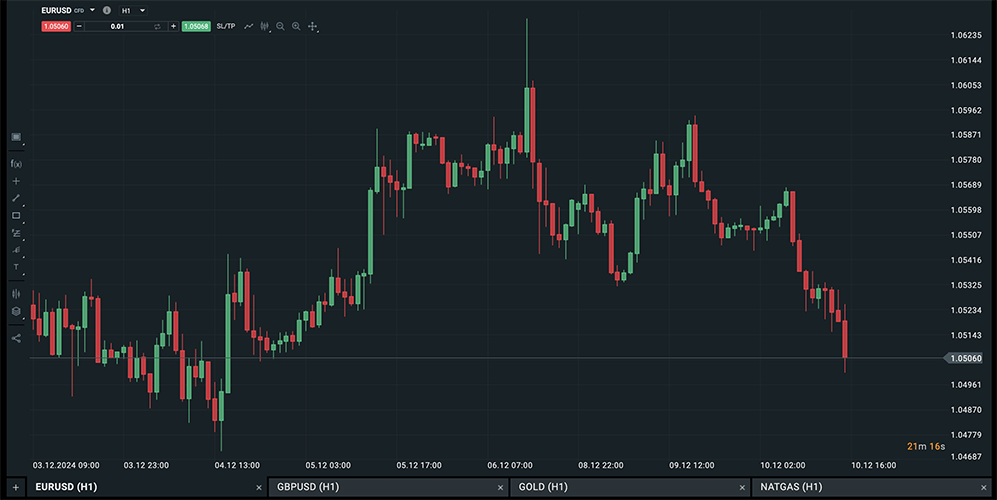
Key Features, Tools & Platforms
☑️ Powerful xStation Platform: XTB’s proprietary trading platform, xStation 5, is one of the most advanced and user-friendly UK online trading platforms. It offers fast execution, intuitive design, and built-in tools like heatmaps, sentiment analysis, and performance tracking.
☑️ Demo account: XTB offers a demo account, which is a valuable tool for new traders to practise without risk
☑️ Commission-Free Stock & ETF Trading: XTB offers zero-commission trading on real stocks and ETFs (up to a monthly cap), making it highly cost-effective for long-term investors and those looking to build a diversified portfolio.
☑️ Top-Rated Mobile App: The xStation mobile app mirrors the desktop experience, giving traders full control of their accounts and real-time market access on the go. It’s fast, responsive, and consistently rated highly by users.
☑️ Market Analysis Tools: XTB comes with built-in tools such as economic calendars, technical indicators, news feeds, and analyst recommendations. This makes it ideal for both short-term traders and long-term investors looking for informed decision-making.
☑️ XTB Academy: XTB offers a comprehensive educational hub featuring free webinars, video tutorials, articles, and eBooks. The learning material is structured by experience level, making it easy for beginners to progress at their own pace.
☑️ Wide Range of Assets: XTB offers exposure to over 5,800 trading instruments (including stocks, ETFs, forex, indices, commodities, and CFDs), so there’s no shortage of options.
☑️ ISA Accounts: XTB offers ISA (Individual Savings Accounts) accounts for UK traders seeking tax-efficient investment options.
☑️ Dealing Account: The XTB Dealing account has a minimum balance requirement of £0.
| ⭐ Highlight Feature: One of the standout features of XTB is its xStation 5 trading platform. It combines professional-grade charting with a clean, beginner-friendly interface, making it equally valuable for new and experienced investors. |
What We Like About XTB
XTB stands out for its xStation 5 platform, which combines professional-grade tools with beginner-friendly design.
The platform’s layout, speed, and usability make trading smooth and efficient.
It also offers a wide range of assets for strong diversification and tight spreads that help lower trading costs.
Backed by excellent customer support and extensive educational resources, XTB is a top choice for both new and active traders.
Potential Drawbacks
There are a few things to consider before choosing XTB. First, fees vary based on asset and account type. On standard accounts, there’s no commissions on forex/CFDs, but spreads are higher.
Pro accounts offer lower spreads but charge commissions for trading ($3.50 per lot per side ($7 round trip) on Forex, commodities, indices, and crypto CFDs). This can make using the platform complex for some.
Also, commission-free trading on stocks and ETFs is capped by monthly volume (usually €100,000). Exceed the limit, and trading fees will apply. Also, XTB’s forex fees are relatively high compared to other platforms.
Another thing to note is that XTB is primarily geared towards CFD trading, which may not be ideal for long-term investors seeking to buy and hold physical assets.
Lastly, unlike some competitors, XTB doesn’t widely support fractional share trading, which can make it harder to invest small amounts in high-value stocks.
| 👉 Our Take: XTB is an excellent choice if you’re looking for a powerful platform with a wide range of assets and competitive spreads, especially one that also has strong educational resources and customer support. |
Key rating criteria:
| No. of stocks | No. of stock markets | Real stock fees | Non-trading fees | Minimum deposit | Trading platforms |
|---|---|---|---|---|---|
| 3,100+ | 17 | £0 | Inactivity fee of £10 per month after 1 year of trading inactivity and if no deposit was made in the last 90 days | £0 | Proprietary web trading platform/mobile app xStation 5 |
Pros:
- Commission-free stocks and ETFs for investments up to £100k per month
- Free and speedy deposit and withdrawal process
- Swift and simple account opening
Cons:
- Charges an inactivity fee
- Commission-free trading on stocks and ETFs is capped by monthly volume
73% of retail investor accounts lose money when trading CFDs with this provider.
3. IG – Best stock broker UK for a selection of investment options

IG, established in 1974, is acknowledged as a top stock broker in the UK.
With access to over 17,000 markets day and night (largely through CFDs and spread bets), IG stands out for offering a broad range of investment options.
The FCA regulates IG, ensuring top-tier investor safety. Client funds are kept in separate trust accounts, protected from company use.
IG’s trading platform excels in flexibility and is user-friendly across various devices, including Android, Windows, and iOS.
It features advanced tools like ProRealTime, MetaTrader 4, and L2 Dealer, which allow traders to create custom indicators and directly access stock exchange order books via DMA.
While IG’s superior services come with notable costs, such as share commissions and inactivity fees after two years, the value provided justifies the expense for active traders.
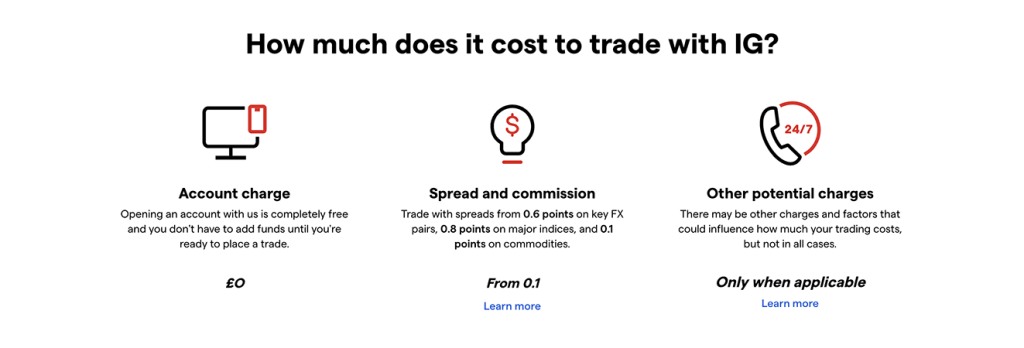
Key Features, Tools & Platforms
☑️ Wide Market Access: IG provides access to more than 17,000 markets, including stocks, forex, indices, commodities, and more, which far exceeds most competitors.
☑️ Advanced Trading Platforms: IG offers multiple platforms, including its powerful web-based trading platform, mobile app, and access to MetaTrader 4 (MT4). Each is packed with professional-level tools like pro-grade charting, indicators, and real-time analytics.
☑️ Demo Account: IG provides a demo account loaded with thousands of practice money. This allows users to practice trading in a risk-free environment before committing real capital.
☑️ Competitive Spreads: IG offers tight spreads and low commissions on CFDs, making it a cost-effective option for active traders.
☑️ Highly Rated Mobile App: The IG mobile trading app is fast, secure, and feature-rich, making it perfect for managing trades or watching the markets on the move.
☑️ IG Academy: This is IG’s dedicated educational platform that offers structured lessons, interactive courses, and live webinars for investors of all levels. It is ideal for beginners wanting to build up market knowledge.
☑️ Share Dealing Account & ISA: IG supports commission-free UK share dealing and also offers a Stocks and Shares ISA, allowing UK investors to grow their portfolios in a tax-efficient wrapper.
☑️ Smart Portfolio Options: IG offers managed portfolios powered by BlackRock, designed for long-term growth with automated rebalancing and low fees.
| ⭐ Highlight Feature: IG is excellent for traders who rely on technical analysis and automated strategies. Its use of ProRealTime and MT4 means it provides some of the most advanced trading tools available. |
What We Like About XTB
IG offers comprehensive market access and advanced trading tools, including detailed charts, extended trading hours, and expert research. Its flexible platforms suit both beginners and experienced investors looking to trade stocks, funds, forex, or futures.
You can open an account for free, benefit from competitive spreads, and trade under a strong FCA-regulated framework with negative balance protection. IG also provides 24/7 customer support, reinforcing its reputation as a trusted broker for UK traders.
Potential Drawbacks
While IG offers several benefits, it’s important to consider its downsides before jumping on it.
First, due to its extensive features, the platform may overwhelm beginners. The sheer volume of options can be intimidating at first.
Additionally, while IG offers tax-efficient Stocks and Shares ISAs, they require a relatively high minimum deposit of £500. This high minimum may be a barrier for beginners wanting to start small.
Also, IG’s commission-free trading is limited. Its commission-free UK share dealing only applies if you place 3 or more trades in the previous month. Otherwise, a £3 or £8 fee applies depending on activity level. Passive investors should also know that IG charges a £12 monthly inactivity fee after 24 months of no trading activity.
| 👉 Our Take: IG presents a well-rounded, secure, and prize-winning platform that caters to the wide-ranging needs of both new and experienced traders. |
Read our IG review.
Key rating criteria:
| No. of stocks | No. of stock markets | Real stock fees | Non-trading fees | Minimum deposit | Trading platforms |
|---|---|---|---|---|---|
| 12,000 | 8 | Depends on how many trades you made in the preceding months | Quarterly custody fee, inactivity fee charged only after 2 years | £250 | Proprietary web trading platform/mobile app, MetaTrader 4, ProRealTime, L2 Dealer |
Pros:
- Premium web trading platform
- Excellent educational resources
- Diverse deposit and withdrawal options
Cons:
- Customer support can be slow
- Minimum deposit of £250
Spread bets and CFDs are complex instruments and come with a high risk of losing money rapidly due to leverage. 69% of retail investor accounts lose money when trading spread bets and CFDs with this provider. You should consider whether you understand how spread bets and CFDs work, and whether you can afford to take the high risk of losing your money.
4. Plus500 – Best for short-term trading of CFDs

Plus500, a distinguished CFD stock broker in the UK, appeals to traders who prioritise affordability.
It offers low-cost stock CFD trading and competitive spreads, even with fees for overnight funding, currency conversion, and guaranteed stop orders.
The broker’s platform works across Android, Windows, and iOS, offering over 2,000 CFD instruments across various markets.
Beyond stocks, Plus500 offers CFDs in options, ETFs, forex, commodities, and indices. This range provides traders with numerous choices for investment.
Its zero commission on trades and no charges for deposits or withdrawals make financial dealings straightforward.
As one of the stock brokers regulated by the FCA, Plus500 assures traders of its commitment to safety.
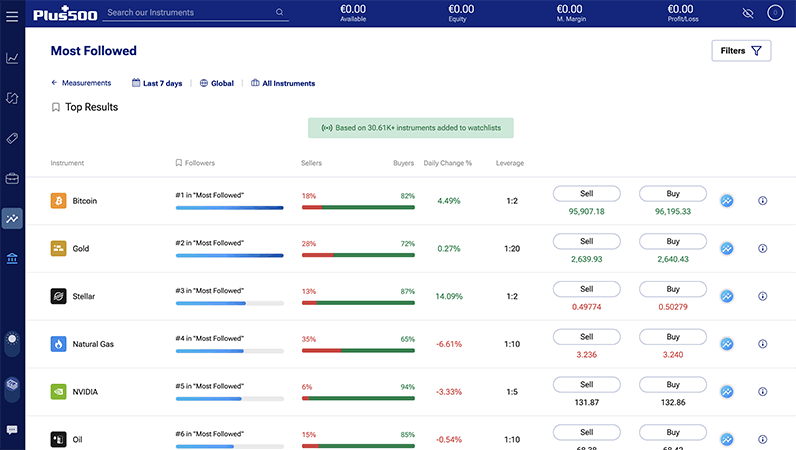
Key Features, Tools & Platforms
☑️ Simple, User-Friendly Platform: Plus500 has a clean, minimalist platform that’s designed with ease of use in mind. It’s great for beginners who want a no-fuss, intuitive trading experience across desktop and mobile.
☑️ Demo Trading Account: Plus500 offers a demo account that beginners can use to practice trading without risking real money.
☑️ CFD Trading Focus: Plus500 specialises in CFDs, offering access to a wide range of instruments, including stocks, forex, commodities, indices, ETFs, and cryptocurrencies.
☑️ Wide Range of Markets: Plus500 is suitable for those interested in global markets, offering access to over 2,800 instruments across global markets without traditional stock brokerage constraints.
☑️ Insights Tool: Plus500’s standout tool is its insight tool, which analyses trades in real-time and evaluates market sentiment. This helps traders spot trends and identify profitable opportunities more effectively.
☑️ Advanced Search and Alerts: You can use advanced filters and set alerts to keep you updated on market movements. This helps you react quickly to changes.
☑️ Risk Management Tools: Plus500 comes with built-in features (like stop-loss, trailing stop, and guaranteed stop) that help traders manage risk more effectively. This is a key advantage for those using leverage.
| ⭐ Highlight Feature: The Plus500 Insight tool is one of its best features, as it empowers users to identify profitable trades, giving them a competitive edge and allowing them to make informed decisions. |
What We Like About Plus500
Plus500 provides advanced tools that help experienced traders make informed decisions, including market insights, price alerts, and detailed search filters for spotting opportunities.
All trades come with zero commission, with costs included in the spread for transparent pricing. The platform also delivers fast, responsive customer support, making it a reliable choice for active UK traders.
Potential Drawbacks
Before jumping on Plus500, you should consider its drawbacks. First, it charges a USD 10 monthly inactivity fee after just three months of non-use.
This is short, considering that many platforms allow inactivity for up to 1 year before penalising it with a fee. However, you can avoid the fee by simply logging in to your account.
Additionally, while Plus500’s customer support is excellent, its educational materials are somewhat limited. This is a serious issue for individuals who may want to explore a broker’s self-help options before directly contacting them.
| 👉 Our Take: Plus500 is well-suited for experienced traders seeking a streamlined platform for CFD trading, backed by real-time market insights and responsive customer support. |
Read our Plus500 review.
Key rating criteria:
| No. of stocks | No. of stock markets | Real stock fees | Non-trading fees | Minimum deposit | Trading platforms |
|---|---|---|---|---|---|
| 1,900 stock CFDs | 6 | S&P 500 CFD spread: 0.7 | Inactivity fee of $10 per quarter after 3 months if you don’t log in | $100 | Proprietary web trading platform/mobile app Web-Trader |
Pros:
- Intuitive, user-friendly platform
- Easy and efficient account setup
- Fast and responsive customer service
- Real-time quotes and advanced analytics
Cons:
- Lacklustre research capabilities
- CFD fees are middle-of-the-road
80% of retail investor accounts lose money when trading CFDs with this provider.
5. Interactive Brokers – Best UK stock broker for experienced traders

Interactive Brokers (IBRK) is recognised as a strong and versatile broker in the UK, appealing to both new and experienced stock market traders.
It provides access to over 70 global stock exchanges, offering vast market reach for investors.
The broker prioritises safety, adhering to high regulatory standards. Its cost structure is attractive, with low fees for shares and ETFs.
Interactive Brokers offers two account types: IBRK Lite for beginners and IBRK Pro for seasoned traders, each designed to meet different trading needs.
The platform is known for its extensive trader education, with courses, webinars, and a demo account that allows practice with virtual funds.
Interactive Brokers stands out for its adaptability, catering to users’ growing investment knowledge with access to a range of both local and global assets.
In summary, Interactive Brokers serves as a comprehensive broker in the UK. We were able to start without a minimum deposit, benefiting from its breadth of resources and investment options, which solidify its place as a top broker choice.
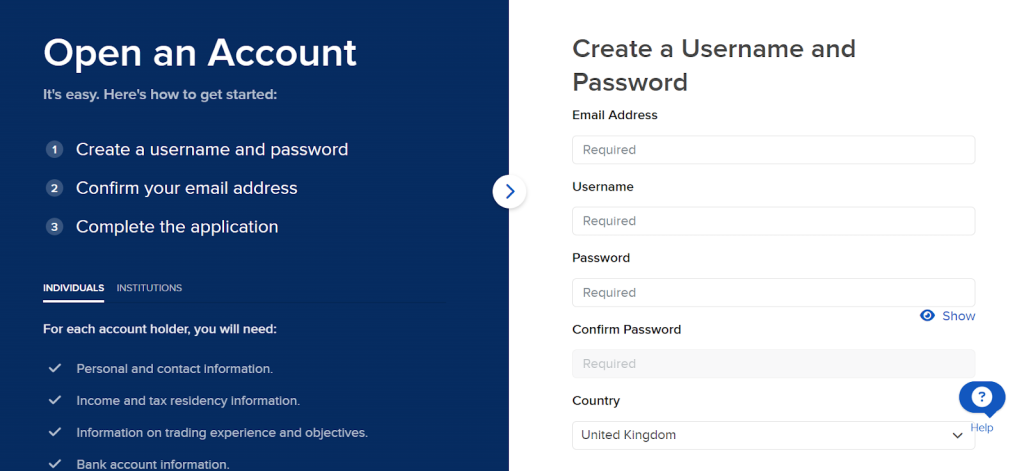
Key Features, Tools & Platforms
☑️ Advanced Trading Tools: The Trader Workstation (TWS) platform of Interactive Brokers offers institutional-grade tools, including algorithmic trading, customisable charts, and real-time market scanners. This makes it a top choice for advanced investors.
☑️ Access to Global Markets: Interactive Brokers offers one of the broadest market reaches of any platform. It provides UK investors with access to over 150 markets in more than 30 countries, including the US, the UK, Europe, and Asia.
☑️ Ultra-Low Trading Fees: IBKR is known for its competitive pricing, as it offers some of the lowest commissions in the industry, with tiered or fixed pricing models to suit different trading styles. UK stock trades can cost as little as £1.
☑️ Fractional Shares: IBKR supports fractional share trading, which allows you to invest in high-priced stocks like Amazon or Tesla with as little as £1. This is ideal for beginners or those building a diversified portfolio with limited capital.
☑️ Mobile App: IBKR has a highly functional app packed with features that allow users to trade on the go with full access to markets, watchlists, and portfolio management tools.
☑️ Campus & Education Centre: IBKR offers a well-developed learning portal featuring webinars, video courses, articles, and how-to guides. It’s ideal for both beginners and seasoned investors seeking to refine their strategies.
☑️ ISA & SIPP Accounts (UK): Unlike some brokers, Interactive Brokers offers tax-efficient options for UK investors, including Stocks and Shares ISAs and SIPPs through partner providers.
| ⭐ Highlight Feature: One of the most powerful features of Interactive Brokers is its access to 150+ global markets across 30+ countries, all from a single account. Whether you’re investing in UK stocks, US tech giants, or emerging markets in Asia, IBKR gives you true international diversification. |
What We Like About Interactive Brokers
Interactive Brokers (IBKR) excels in global market access, offering trading across 150+ markets in 30+ countries, ideal for investors seeking international diversification.
There’s no minimum deposit for standard accounts, while margin trading requires £2,000.
UK share dealing starts from just £1 per trade, with tiered pricing for high-volume traders. IBKR also supports fractional shares, allowing beginners to invest in top stocks like Amazon or Google with smaller budgets.
Potential Drawbacks
Like other platforms, IBKR comes with a few drawbacks. For example, its Trader Workstation (TWS) is extremely powerful but may be overwhelming for beginners.
Also, while IBKR has ultra-low fees, it can be a drawback that it does not offer commission-free stock deals. Currency conversion fees are relatively high and can add up over time.
While IBKR offers ISA accounts, it is unfortunate that the minimum to open these accounts is £1,000, which can be too high for those starting out with small investments. Lastly, support is limited for basic plans.
| 👉 Our Take: Interactive Brokers serves as a comprehensive trading platform in the UK. And it’s perfect for individuals who want to start without a minimum deposit and benefit from a wide range of resources and investment options. |
Read our Interactive Brokers review.
Key rating criteria:
| No. of stocks | No. of stock markets | Real stock fees | Non-trading fees | Minimum deposit | Trading platforms |
|---|---|---|---|---|---|
| 12,162 | 90 | Fixed pricing: $0.005 per share, min. $1, max. 1% of trade value | One withdrawal is free per month, after that $10 | £0 | Trader Workstation (TWS), IBKR GlobalTrader, IBKR Mobile, IMPACT |
Pros:
- Competitive trading fees and attractive interest rates (as high as 4.58% for USD) on cash balances
- Extensive product offerings
- Abundant high-quality research tools
Cons:
- Intricate desktop trading interface
- Limited customer service
What is an online stock broker?
An online stock broker is a digital platform that allows you to buy and sell shares, ETFs, and other financial instruments directly from your computer or smartphone. Unlike traditional brokers, online brokers execute trades electronically, offering real-time market access and lower costs.
These platforms act as intermediaries between retail investors and global stock exchanges, letting you manage investments, monitor performance, and access research tools all in one place. Most also provide educational materials, portfolio tracking, and market news to help you make informed decisions.
In the UK, reliable online brokers are regulated by the Financial Conduct Authority (FCA) and often include FSCS protection up to £85,000. This regulation ensures your funds are held securely and that the broker follows strict transparency and client-protection standards.
Online brokers typically cater to all experience levels. Beginners benefit from user-friendly apps and commission-free stock investing, while experienced traders gain access to advanced platforms, global markets, and low spreads.
What account type should I consider?
The best account type depends on your investment goals, tax position, and activity level.
Below are the main options available to UK investors:
General Investment Account (GIA): A flexible, standard account with no annual contribution limit. Suitable for short-term investing but no tax benefits. Profits above HMRC thresholds are subject to Capital Gains or Dividend Tax.
Stocks and Shares ISA: A tax-free investment account allowing up to £20,000 per tax year. You pay no tax on gains, interest, or dividends, making it ideal for long-term, tax-efficient growth.
Junior ISA (JISA): A tax-free account for children, managed by a parent or guardian. It helps build long-term savings, with access available when the child turns 18.
Self-Invested Personal Pension (SIPP): A private pension account offering tax relief on contributions. Designed for retirement investing, with access from age 55 (rising to 57).
How do I choose a stockbroker in the UK?
Choosing the right UK stockbroker depends on your investing goals, trading style, and budget. Start by confirming the platform is FCA regulated and offers FSCS protection up to £85,000, ensuring your funds are secure.
Next, compare fees, minimum deposits, and available markets. Long-term investors may prefer brokers with low annual account costs and ISA or SIPP options, while active traders should prioritise tight spreads, fast execution, and advanced tools.
Also assess usability, mobile app quality, and research or education features. A good UK broker makes it easy to invest confidently, whether you’re building your first portfolio or managing a global trading strategy.
Common stock broker fees
When choosing a UK stockbroker, it’s important to understand the main fees and charges that can affect your returns.
These typically include:
- Trading fees: Charged per stock or ETF trade, usually between £0 and £10, though many brokers now offer commission-free trading.
- Platform or account fees: Ongoing costs for account maintenance or access to premium tools, often 0.25%–0.45% per year.
- FX fees: Applied when buying international stocks in another currency, typically around 0.15%–1%.
- Non-trading fees: Include withdrawal, inactivity, or transfer charges.
- Spread costs: The difference between buy and sell prices, relevant mainly for CFD and forex trading.
Always review the broker’s fee schedule before investing to avoid hidden costs and ensure the platform suits your trading volume and strategy.
Quick comparison of broker fees
| Broker | Account Types Offered | Platform/Account Fee | Share Dealing Fee | Fund Dealing Fee | FX Fee | Inactivity Fee | Withdrawal Fee | Notable Features |
| eToro | GIA, ISA, LISA | £0 | £1–2 per trade | £0 | 0.5% | $10/month | £0–$5 | Social trading, CopyPortfolios, fractional shares |
| XTB | GIA, ISA | £0 | £0 | £0 | 0.5% | £10/month | £5 (if <£50) | Commission-free stocks/ETFs, leverage trading, mobile app ISA |
| IG | GIA, ISA, SIPP | £0 | £8–11.95 | £0 | 0.5% | £18/month | £0 | Extensive market access, advanced trading tools |
| Plus500 | GIA | £0 | £0 | £0 | 0.5% | £10/month | £0 | CFD-focused, leverage trading, no commissions on trades |
| Interactive Brokers (IBKR) | GIA, SIPP, ISA | £0 | £0.02–0.05/share | £0 | 0.2–0.5% | £0 | £0 | Low-cost trading, global market access, and advanced tools |
| Trading 212 | GIA, ISA | £0 | £0 | £0 | £0.15 | £0 | £0 | AutoInvest, fractional shares, zero-commission trading |
| AJ Bell | GIA, ISA, SIPP | £0 | £5–3.50 | £1.50 | 0.5% | £0 | £0 | Flat-rate dealing, fund discounts, pension options |
| Saxo Bank | GIA, ISA, SIPP | £0 | £3–10 | £0 | 0.5% | £50/month | £0 | Professional-grade platforms, 70,000+ instruments |
| Hargreaves Lansdown (HL) | GIA, ISA, SIPP | £0 | £5.95–11.95 | £0 | 0.5% | £0 | £0 | Extensive research tools, a trusted UK brand, tiered dealing fees |
| Webull | GIA | £0 | £0 | £0 | 0.35% | £0 | £0 | Zero-commission trading, advanced charting, no inactivity or withdrawal fees |
Stock investing vs trading
Investing and trading are two distinct ways to approach the stock market. Investing focuses on long-term wealth building, typically holding shares for years in companies with strong fundamentals and growth potential. In contrast, trading aims to profit from short-term price movements, often over days or hours, by analysing market trends and technical patterns.
Investing rewards patience and stability, while trading demands quick decision-making and a higher tolerance for risk. The right choice depends on your goals, time commitment, and experience level.
How to trade stocks in the UK
You can trade stocks in the UK easily through an FCA-regulated online broker.
Follow these steps to get started:
- Learn the basics: Understand how the stock market works and how orders are placed.
- Pick a trading strategy: Choose from day trading, swing trading, or long-term investing depending on your goals.
- Select an FCA-regulated broker: Compare fees, platforms, and customer support.
- Open and fund an account: Complete ID verification and deposit funds securely.
- Research and analyse: Review company fundamentals and technical indicators.
- Place your trade: Use a market or limit order to buy or sell shares.
- Monitor and adjust: Track performance and rebalance your portfolio as needed.
- Understand tax rules: Profits may be subject to Capital Gains Tax, unless held in a Stocks and Shares ISA.
Popular stock trading strategies
Here are some of the most common trading and investing strategies used in the UK:
- Buy and hold: Long-term investing based on steady market growth.
- Value investing: Focus on undervalued stocks with strong fundamentals.
- Growth investing: Target high-growth companies, even at premium prices.
- Momentum trading: Buy rising stocks and sell declining ones.
- Swing trading: Capture short- to mid-term gains over days or weeks.
- Day trading: Buy and sell within a single day to exploit intraday volatility.
- Dividend investing: Build passive income through dividend-paying shares.
- Pound-cost averaging: Invest a fixed amount regularly to reduce volatility risk.
Each strategy carries its own risk and time commitment. Many traders mix approaches and adapt over time.
Pros and cons of stock trading
Pros
- High return potential compared with savings or bonds.
- Liquidity, allowing you to buy or sell shares quickly.
- Diversification across companies and industries.
- Dividend income from selected stocks.
- Accessibility via low-cost online brokers.
Cons
- Market volatility can cause sudden losses.
- No guaranteed returns — capital is always at risk.
- Time-consuming for active traders.
- Emotional stress from rapid market fluctuations.
Top picks by use case
Best for beginners – Trading 212 and eToro
Trading 212 and eToro are ideal for new investors in 2025. Both offer zero-commission stock trading, low minimum deposits, and easy-to-use mobile apps. Trading 212 features fractional shares and clear portfolio tracking, while eToro’s CopyTrader lets beginners mirror expert investors. Each includes educational tools and transparent order execution to simplify learning.
Best for active traders – IG and Interactive Brokers
IG and Interactive Brokers (IBKR) lead in performance and professional tools. IG’s ProRealTime enables algorithmic trading, one-click execution, and fast charting. IBKR provides API access, real-time margin analytics, and institutional-grade order routing. Both deliver tight spreads, low latency, and custom dashboards for precision trading.
Best for global investing – Saxo Markets and Interactive Brokers
For worldwide market access, Saxo Markets and IBKR stand out. Saxo connects to 40+ international exchanges and supports multi-currency accounts. IBKR goes further with 150+ global markets, fractional US shares, and seamless cross-asset trading, all while minimising FX exposure.
Best for long-term and dividend investors – Hargreaves Lansdown and AJ Bell
Hargreaves Lansdown and AJ Bell remain top choices for long-term UK investors using ISAs or SIPPs. Both offer dividend reinvestment, reliable customer support, and comprehensive research tools. While platform fees are higher (around 0.25%–0.45%), the service quality and stability justify the cost for income-focused portfolios.
Best for ETF-focused investors – InvestEngine and Vanguard
InvestEngine and Vanguard specialise in low-cost ETF portfolios for passive investors. InvestEngine offers free DIY ETF investing and low-cost managed options, while Vanguard provides index funds and ETFs through ISA, SIPP, and GIA accounts. Both prioritise diversification, tax efficiency, and long-term compounding.
Non-trading costs
- Currency conversion fees: FX mark-ups range from 0.15% to 1.5%. IBKR and Saxo offer the lowest via multi-currency accounts, while Trading 212 and eToro apply higher retail rates.
- Inactivity fees: Saxo Markets and CMC Markets charge after 6–12 months of no trading; eToro and Trading 212 do not.
- Withdrawals and deposits: IG and XTB offer free withdrawals. eToro charges $5 per withdrawal, while IBKR may apply small wire fees.
- Custody fees: Traditional brokers like Hargreaves Lansdown and AJ Bell charge 0.25%–0.45% annually. Zero-commission platforms such as Freetrade and Trading 212 have none.
- Dividend handling: IG and Hargreaves Lansdown process dividends automatically at no extra cost; others may apply per-event fees.
Mobile vs desktop performance
- Mobile trading: Trading 212 and eToro excel in app design and usability, offering quick order execution and real-time tracking. IG’s app includes full charting and news integration for professionals. Some smaller brokers lack advanced order types or may lag during volatile sessions.
- Desktop platforms: IG, Saxo Markets, and IBKR provide advanced charting, Level 2 data, and multi-screen workspaces for professional traders. Trading 212’s web app is simple but limited for advanced strategies.
Where brokers fall short
Feature gaps between mobile and desktop platforms remain common. Some lack trailing stops, indicator syncing, or reliable trade alerts across devices. Delayed notifications and inconsistent watchlists still affect the user experience. A seamless, fully-synchronised trading environment across all devices is what separates retail-grade brokers from professional-level platforms.
Final thoughts
The best UK stock broker for you depends on your experience, trading style, and goals.
Beginners may prefer simple, low-cost apps like Trading 212 or eToro, while active traders and global investors will benefit from IG, Saxo Markets, or Interactive Brokers.
Always choose an FCA-regulated broker with clear fees, reliable support, and strong investor protection.
Take time to compare platforms, test demo accounts, and pick one that fits your long-term investing strategy.
FAQs
What is the best way to buy stocks in the UK?
The best way to buy stocks in the UK is through an online stock broker.
– First, choose a broker regulated by the Financial Conduct Authority (FCA) to ensure safety and compliance. Look for platforms with low fees, a wide range of stock options, and educational resources.
– Register for an account with the chosen broker, complete the required identity checks, and deposit funds. Use the broker’s platform to research and select stocks.
– Decide how much to invest and whether to place a market order (buy at the current price) or a limit order (set a specific price).
After buying, monitor your stocks through the online trading platform. Consider diversifying your portfolio to manage risk. Always review the performance of your stocks and stay updated on market trends. For tax efficiency, consider using a Stocks and Shares ISA account, which allows for tax-free gains. Remember to invest wisely and consider seeking advice from a financial advisor if needed.
Where to buy stocks for beginners in the UK?
For beginners in the UK looking to buy stocks, consider starting with reputable online stock brokers such as eToro, IG Markets, or XTB. These brokers offer user-friendly interfaces, educational resources, and robust customer support, making them ideal for those new to stock investing. Additionally, many also offer demo accounts to practice without using real money.
Do you need a broker to buy stocks in the UK?
Yes, in the UK, you need a broker to buy stocks. Brokers act as intermediaries between the stock market and individual investors, facilitating the purchase and sale of shares. Online platforms and traditional brokerage firms offer these services, allowing UK investors to access the stock market.
Is eToro safe in the UK?
Yes, eToro is considered safe in the UK. It is regulated by the Financial Conduct Authority (FCA), ensuring that it adheres to strict regulatory standards designed to protect UK investors.
Which stockbroker has the lowest fees in the UK?
The stock broker with the lowest fees can vary based on trading frequency and the type of assets traded. eToro, for instance, offers commission-free stock trading for UK residents. However, it’s essential to compare brokers and consider other factors like platform fees and spreads to determine the most cost-effective option for individual needs. Always check the latest fee schedules on broker websites before making a decision.
What’s the cheapest UK broker?
eToro is among the brokers in the UK offering commission-free stock trading. However, “cheapest” can vary based on your trading habits and the assets you’re interested in. It’s important to consider both trading and non-trading fees when evaluating cost-effectiveness. Always review the most recent fee structures on broker websites to determine the best fit for your needs.
Can you lose money in stocks?
Yes, investing in stocks carries risks, and you can lose money based on market fluctuations and the performance of the specific companies you invest in. It’s important to research and potentially consult with financial advisors before making investment decisions.
How do stockbrokers make money?
Stock brokers make money through commissions on trades, account maintenance fees, margin interest, and sometimes by selling order flow to larger brokerage firms. They may also earn from offering additional financial services or products.
Are UK stock brokers regulated?
Yes, UK stock brokers are regulated by the Financial Conduct Authority (FCA), ensuring they adhere to strict standards and practices for the protection of investors.
What is the minimum amount of money I need to invest in stocks and shares?
There’s no fixed minimum to invest in stocks and shares; it varies by broker and the specific investment. Some platforms allow investing with as little as £1, while others may require more. Always check the broker’s terms before investing.
Who is the largest broker in the UK?
Hargreaves Lansdown is the largest broker in the UK in terms of assets under management and client base.
Are UK stock brokers safe?
Yes, UK stock brokers are regulated by the Financial Conduct Authority (FCA), ensuring they adhere to strict standards and offer a high level of safety for investors.
Which broker is best for buying shares?
For buying shares, eToro and IG Markets are among the top choices. eToro is well-known for its user-friendly interface and social trading features, allowing users to copy the trades of successful investors. IG Markets offers a robust trading platform and a wide variety of shares, making it a strong option for both beginners and experienced traders.
Where to buy stocks in the UK?
In the UK, you can buy stocks through various platforms, including online brokers, traditional brokerage firms, and investment apps. Well-known online stock brokers like eToro, IG Markets, and Plus500 offer a range of options for buying and selling shares (CFDs). These platforms provide the convenience of trading from your computer or mobile device and often come with research tools, real-time data, and educational resources to help you make informed decisions. Always ensure that the broker you choose is regulated by a reputable financial authority, such as the Financial Conduct Authority (FCA) in the UK.
Do I have to pay tax when buying or selling shares?
You don’t pay tax when you buy shares, but you may owe Capital Gains Tax (CGT) when you sell shares at a profit. You will also owe tax if you receive dividend income over £500 is also taxable. You can avoid tax by using ISAs or SIPPs, which are tax-efficient wrappers.
Is it better to invest a lump sum or make regular smaller investments?
It depends on your financial situation and risk tolerance. Lump sum investing can be more profitable over time if markets trend upward, as your money is exposed to growth earlier. On the other hand, regular, smaller investments reduce the impact of volatility and spread risk, which is ideal during uncertain markets.
What kind of regulatory protection should I expect from a broker?
Reputable UK brokers are regulated by the Financial Conduct Authority (FCA) and offer protection through the Financial Services Compensation Scheme (FSCS).
What does the 7% rule mean in stock investing?
The “7% rule” refers to the long-term average annual return of the stock market. This rule came about because, historically, major indices (like the S&P 500) have returned around 7% per year after inflation.
Are trading apps a good option for investors?
Yes, trading apps are good options for most investors, especially beginners and casual investors, as these apps offer convenience, low fees, and user-friendly interfaces.
You may also like:
Sources:







